- Home
- Martin Amis
Money Page 20
Money Read online
Page 20
'What's that? Fifty grand?'
'Easy.'
'All the more reason then. Terry Linex made a pass at me.'
'What? When?'
'I thought he was just messing about. Then my eyelashes got caught in his zip. Then he —'
'Christ, enough! Come here.'
She hummed.
'Why not?'
She jounced her black dress. 'You know why not.'
Actually I was by no means sure. We've been fighting about money of late, but then again it might be my face. Never my best feature, my face is still swollen, up there on the left-hand side. That tooth caught fire again. I took my poor mouth to Martha McGilchrist, who exasperatedly drained it for me. Any chick who fancies herself as a feminist ought to go and see Martha McGilchrist. Boy is she butch. She makes me feel like a starlet. Martha McGilchrist—she's a bloke. She also said that when my tooth catches fire again, which it will, I won't be able to save it for love or money. That tooth will just have to wait for California, along with everything else.
I shouted at Selina for a while and returned to the sofa and my drink. The television was on. The television is always on. This afternoon, as I passed the square, I saw two dogs skewered together, back to back. Their owners stood around, waiting. The dogs were waiting too: they looked embarrassed, foolish, but stoical. They had been through all this before, or at least their genes had. It is dangerous if you try to separate them ... On television I watched a nature short about two-headed snakes. Two-headed snakes are rare and don't last very long. They're forever quarrelling about food and which way to go. They keep trying to kill and eat each other all the time. Soon, one head becomes dominant. The smaller head is obliged to tag along but has no say in things any more. This arrangement keeps them going for a little while. But they both die quite quickly.
If there's one thing I think I'm sure of, it's the fact that I must marry Selina. I'm pretty sure about this, I think, Yes, it is time I settled down, grew up. There's no choice really: not settling down and not growing up are killing me. I've got to quit it, being young, before it's too late.
I must marry Selina and settle down and raise a family. I must be safe. Christ, safe sounds frightening. Settling down — that seems a bit adventurous, a bit precipitate, to me. Having kids! That's what takes real balls. To become a husband and a father: no you can't get much butcher than that. Yet nearly everyone shapes up to it in the end. I bet you have or will soon. I want it too, I think, in a way.
Of course, something is missing. Ah, you noticed. You are not blind. But it is missing in me, in her, it is missing, it will never be there. Selina and I are very well suited. We get along like nobody's business. I must marry Selina. If I don't, I'll just die. If I don't, no one else will, and I'll have ruined another life. If I don't, I think she might sue me for every penny I have.
——————
Today I made a break with habit and tradition, and took my lunch at the New Born Restaurant. The New Born is a hot little grotto of plastic panels and formica tabletops, half a cheap-bistro, half yobs'-beanery, run by an elite squad of Italians together with some straggly irregulars — local charwomen, reformed bagladies, London sweepers. You get all sorts in here, from dustmen to middle-management. The menu is chip-orientated, but the place is licensed. How else could it seriously expect my custom? Today I called for the gravy dinner plus two vedge and a carafe of red — which for me, rotting veteran of Pizza Pit and Burger Shack, of Doner Den and Furter Hut, is the equivalent of a handful of brown rice and a glass of effervescent Vitamin C. (There are health-food joints around here, run by aged hippies or unsmiling Danes. But I won't eat that shit. I just won't eat it.) I was sitting there waiting for the grub to show when Martin Amis came through the open door — you know, the writer I was chatting to in the pub the other night. The place was pretty full, and he hesitated until he saw the empty bench at my table. I don't think he saw me.
Martin sat down opposite and quickly flattened a book out in front of him. This kid is going to ruin his eyes... Me, I had plenty on my mind, including a desperate hangover, and was in no mood for complications. Last night had been a new one. Cocktails: £17. Dinner: £68. Selina: £2,500. You heard me, two-and-a-half big ones. That handjob I scored at the Happy Isles — I tell you, She-She was giving it away. I'm losing my grip, I'm falling to pieces. A year ago, Selina's two-hour session of candlelit fund-raising would have gained her nothing more than a clout round the ear (I'd have done it nice, mind you, not in the restaurant or anything like that but in the Fiasco or back at the sock). I really am cracking up, I really am deteriorating. I gave her the cheque in the bedroom. She folded it into the cleft of her black bra. Then, boy, did I get mine. An hour later the telephone rang. It was one o'clock. 'Don't answer it,' whispered Selina. But I welcomed the interruption, to the precise degree that Selina deplored it. She and I separated (it was like trying to unpick a mangled shoelace) and I staggered through to take the call. Fielding Goodney, with all kinds of developments: a 'dream script' had come through from Doris Arthur, Caduta Massi and Butch Beausoleil had put their signatures on the line, Spunk wanted in, Lorne wanted out — Lorne Guyland was going crazy, or was staying that way. Money was falling from the sky quicker than Fielding could catch it. Refreshed, exhilarated, I went next door again, the brandy bottle swinging from my hand, and made Selina curse her mother for ever giving her birth. Two thousand five hundred pounds — now that's a lot of money. But Fielding was talking millions. If everything went through okay, I'd be able to sleep with Selina every night for the rest of my life.
The wine arrived. I had the meal to get through anyway, so I leaned forward and said, 'Fate.'
He looked up with a flash of panic — but then he calmed and smiled. He recognized me. People usually do. I haven't got that problem, the problem of not being recognized. If s one of the kickbacks you get for looking like I look.
'Oh, hi,' he said. 'We can't go on meeting this way.'
'What are you doing in this dump? Why aren't you having lunch with your, with your publisher or something?'
'Come on. I have lunch with my publisher every other year. What do you do?'
'I'm in films,' I said. 'Right up to here.'
Then why aren't you having lunch with Lorne Guyland? See what I mean? It just doesn't happen that often.'
'What made you say Lorne Guyland?' Perhaps he'd recognized me — or recognized me. After all, I'm tolerably well known in some circles.
'No reason,' he said.
'John Self.' I held out my hand and he took it.
'Martin Amis.'
'Check.'
'Hey,'he said, 'was it—are you the guy who made those commercials, the ones they took off the air?'
That's me.'
'Ah.' He nodded. 'I thought those commercials were bloody funny. We all did.'
'Thanks, Martin,' I said.
The waitress showed with my heaped and steaming plate. She took Martin's order. He surprised me again by opting for a standard yob's breakfast — egg, bacon and chips. No, I don't think they can pay writers very much at all.
'Toss?' asked the girl, one of the Italian contingent, though her colouring had been exhaustively naturalized by the kitchen spores.
'No, no toast, thanks.'
'Drin?'
'Tea, please,' said Martin.
I gestured at my litre of fizzy red wine. 'Want a drop of this?' I asked him.
'No thanks. I try not to drink at lunchtime.'
'So do I. But I never quite make it.'
'I feel like shit all day if I drink at lunchtime.'
'Me too. But I feel like shit all lunchtime if I don't.'
'Yes, well it all comes down'to choices, doesn't it?' he said. 'It's the same in the evenings. Do you want to feel good at night or do you want to feel good in the morning? It's the same with life. Do you want to feel good young or do you want to feel good old? One or the other, not both.'
'Isn't it a tragedy?'
He looked at me
with some care. Sadly I followed his eyes, and I too saw what he saw. My snowy cheeks and ruddy lids, the coin-slot of my mouth and its tannic teeth — and the rug, a dry rug, a drinker's rug.
'You still put your money on the evenings, though.'
'Yup.'
'And you feel like shit in the morning.' He glanced with amusement at my wine. 'And you feel like shit in the afternoon.'
'Yeah, well I'm a nightowl,' I said uneasily.
His food came—they don't mess about here—and he reached for the salt. Then, as he started to eat, he said quietly, 'I was in the newsagents' the other day—when you had that set-to with the girl.'
'Yeah?' I said, and felt my blood give a sick lurch.
'I thought you handled yourself pretty well, considering. Nasty business.'
'Yeah, it was fucking embarrassing.'
'Of course,' he said, continuing to cut his food crisply, 'you could have argued that the man was being exploited too.'
'What man?'
'There was a man in the photograph, wasn't there.'
'No. The girl just had this dick in her face.'
'Well who do you think the dick belonged to, brilliant?'
'Yeah but girls don't think that's exploitation. They think that, they think all men want to do that stuff anyway.'
'Well, they're wrong, aren't they,' he said mildly. 'I wouldn't want to do it. You wouldn't want to do it. The men do it for money, same as the girls.'
'There must be some guys who like doing it. When I was younger, I always thought it looked like money for jam. Some girls like doing it too, don't forget.'
'You think?'
'Oh sure,' I said. 'I know one who posed in Debonair. She bursts into tears of pride at the very mention.'
'Pride? . .. Yes, I suppose it figures.'
'How?'
'Yob art,' he said, and wiped his mouth. 'Hey look, I've got to run.'
'Come on,' I said, 'you've got to let your meal digest. It's not healthy. Have a drink.'
He shook his head. Before he left, he held out his free hand and I took it.
'Nice talking to you, Martin.'
'Be seeing you, John.'
John. What a name, eh? It means a can, it means a trick. I pushed my plate away and settled back with the wine. I lit a cigarette. I pondered. Yob art. .. Yeah. When Vron had sobbed it all out after showing her prospective stepson photographs of herself having a handjob with no clothes on for money, she explained to me — at throaty length and with hot tears still foiling the points of her lashes — that she had always been creative. 'I was always creative John!' she said again and again, as if I kept impiously insisting that she was creative only sometimes or not until recently. Vron confirmed that she had been good at art as a schoolgirl, often praised by her art master. She instanced her darning skills and her flair for interior design. 'I always knew I'd be in a book one day,' she said, reaching once more for Debonair, 'and now, John, that dream has been realized.' She flattened the spread comfortably on her lap: there was Vron, "Vron", on all fours, at three-quarters rear angle, in stockings, stilettoes and a pair of burgundy pants peeled half way down her pocked haunches. 'Beautiful,' I heard my father gulp over my shoulder. 'You see, John,' said Vron, 'if you have the creative...' 'Gift,' said my father. 'The creative gift, John, then I think you've got to — to give of your gift, John. John. Look at this.' She turned the page. Here Vron reclined on a kittenish white carpet, one leg hooked over an elbow, one hand busy in the central divide, a look of appalled transport on the averted face. 'You see how much I'm giving there, John? That's what Rod kept saying to me, the photographer, John. He kept saying: "Give, Vron, give!" '... I left half an hour later. Vron and Barry were crying again by that time, crying gratefully, consolably, in each other's arms.
And get this. I'm only going to say it once.
Three years ago, when I started to make some real money as opposed to all that other stuff I'd been making, my father hit bad trouble on the tables and the track and he... Do you know what he did, that funker? He submitted a bill for all the money he had spent on my upbringing. That's right — he fucking invoiced me. It wasn't that expensive, either, my childhood, because I spent seven years of it with my mum's sister in the States. I still have the document somewhere. It was six sheets of foolscap, thumb-typed. To 30 pairs of shoes (approx.)... To 4 caravan holidays in Nailsea... To share of petrol to same ... He tabbed me for everything, pocket-money, ice-creams, rug-rethinks, everything. He enclosed a cover note, explaining in his clerkly style that it was of course only a rough estimate, and that I wasn't beholden to reimburse him penny for penny. Inflation had been taken into account. I'd cost him nineteen thousand pounds.
Anyway, we both behaved in character — the same character. On receipt of my father's letter, I got drunk and sent him a cheque for twenty grand. On receipt of my cheque, my father got drunk and put the money on a horse running in the Cheltenham Golden Shield called, I don't know, Handjob or Bumboy or whatever. The horse was young for a chaser and didn't have much in the way of form — but Barry had a hot tip. 100—8 looked good to him. He placed the bet by messenger. One of his villain mates, Morrie Dubedat, set up the deal and vouched for dad's punt ... Ten minutes later Barry panicked and tried to cancel. But the bookie was already out hiring frighteners and the bet had to stand. Jacknifed over the whisky bottle, Barry listened to the radio commentary in closing-time light. Sure enough, Bumboy came lolloping out of its stall, each leg going somewhere different, neighing and dumping in its blinkers and Dobbin hat. Eventually flogged into submission by the iockey, Bumboy set off after its vanishing playmates. The horse received the odd joke mention from the commentator, until my father smashed the radio, finished the whisky, and suffered a near-fatal nosebleed.
Barry has since acquired a video recording of the race and still gloats over it even now. Bumboy not only won: it was more or less the sole survivor. There was one of those churning, drowning pile-ups at the penultimate jump. Bumboy tripped snorting through the chaos — and was clear with one fence to beat. The lone horse pranced flimsily on. It didn't leap that last hedge: it just munched its way through. Then, with only flat green ahead, ten yards from the post, Bumboy fell over. The jockey, who was all whipped out by now, tried to remount. Some of his grounded colleagues got the same idea. After about ten minutes — several riderless horses had skipped over the line by now, and another contender had cleared the last jump, and was gaining — Bumboy was finally scourged out of a series of circles and flopped over the line, home by half a length.
Now this bookie was a middleman, not legal, and my dad took Morrie Dubedat, Fat Paul and two shooters when he went to collect his winnings. Also, I had sobered up by then and caused some complications by trying to stop the cheque — until my father came squealing on to the line. He got his money, after a month of gang warfare — not the full whack by any means, but enough to pay his debts, buy out the brewery, gut the Shakespeare, instal the pool table, the stripper and the strobes... He says he's going to repay me, one of these days. Who cares? It doesn't matter. I'll never get over the grief of that wound. And I don't think he ever meant me to.
I settled the bill — a pretty useful one, what with the line of brandies I had moodily consumed. I returned to my flat and packed a case and started going back to America.
5
the AUTOCRAT moved fast and softly through chintzy prefabs and the continuing scenes of black family life, with its leagues of brothers and stand-offs in the basketball courts, and mothers' shapes behind the insect mesh, calling. Spooked planes buzzed the limo roof at the black spread of water near La Guardia. Ped Xing, No Shoulder, Unlawful To Cross White Line, Traffic Laws Strictly Enforced, Stay In Lane, Upgrade — Maintain Speed. Does My Chauffeur Need To Be Told All This? Wouldn't drive do the trick? We came out of the beach-hut belt and slid down on to the barrelling freeway. Now — here it comes again — the gnashed, gap-toothed skyline, the graphics, the artwork of New York.
At the Ashbery I offer
ed the driver a twenty.
'No sir!' he said. 'That's all taken care of. Would you call Mr Goodney, sir, when you're settled in?'
I tried the twenty on him again. He wouldn't take it, so I pressed it on Felix instead.
'I hate to do this to you, Slick, but you got to go see Lorne Guyland— tonight.'
'Oh man.'
He told me why. I was about to ring off when Fielding asked suspiciously, 'Hey, how did you fly? Coach?'
'Yeah.'
'Slick, I'm going to have to talk to you very seriously about your expenses. Shape up, John. It's an embarrassment. It looks bad to the moneymen. Take a floor at the Gustave. Hire a jet and have a weekend with Butch and Caduta in the Caribbean. Go buy a case of champagne and pour it all over your dick. Spend. Spend. You're no use to me when you fly coach. Fly supersonic. Fly sharp-end. God damn it, Slick, fly right.'
I shaved, showered, changed, drank a mug of duty free and took a hot cab-ride into the East Eighties with Si Wypijewski at the wheel. Or maybe it was Wypijewski Si. New Yorkers will tell you that the surname comes first on the cabbie's ID. But who says? Even with Smith John and Brown David, how can you really be sure over here? I once had a cabbie called Supersad Morgan. Or maybe it was Morgan Supersad. His eyes, at any rate, were brown and terribly melancholy. His eyes were Supersad ...
My mission? To go reassure Lorne Guyland. According to Fielding, Lorne was seriously overdue for reassurance. He had been wanting reassurance for a long time now and hadn't been getting any. 'Do it now, John,' Fielding had counselled. 'You'll save us a lot of sweat in mid-career.' Lorne wanted reassurance about screen supremacy, line ratios and close-up time. Lorne wanted reassurance about his youthfulness, athleticism and general popularity. Lorne wanted reassurance about the nature of his role. Me too, pal Lorne, I sympathize.
Lorne's role was that of Gary, the nogoodnik father. In my treatment I had, I thought, made it pretty clear what Gary was like. Gary was like Barry, like Barry Self: a lantern-jawed know-nothing, an unreflecting hedonist, a mastermould of brute conceit who none the less exploits a small but tenacious legacy of charm and luck... Why do I bother with my father? Who cares? What is this big deal about dads and sons? I don't know — it's not that he's my dad. It's more that I'm his son. I am aswirl with him, with his pre-empting, his blackballing genes. . . Gary, too, had a lot of my dad in him, just as I resembled Doug, the son. When the heroin shows up in the flour, Gary wants to return it to the mob. Doug wants to sell it at its street value, which is two million dollars. They're both bad and greedy, but old Gary is a funker — yes, a lucky funker.

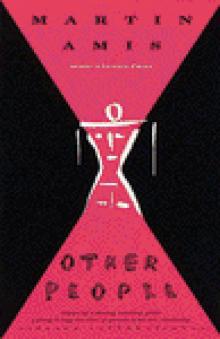 Other People
Other People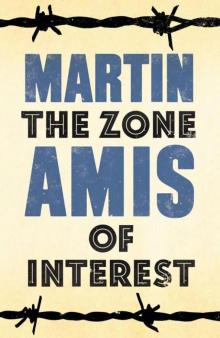 The Zone of Interest
The Zone of Interest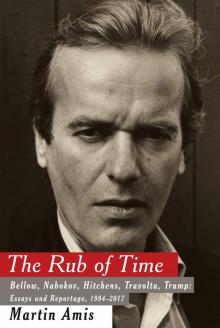 The Rub of Time: Bellow, Nabokov, Hitchens, Travolta, Trump
The Rub of Time: Bellow, Nabokov, Hitchens, Travolta, Trump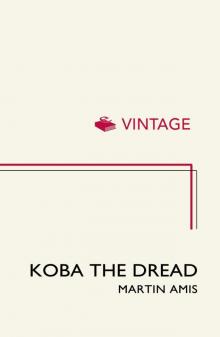 Koba the Dread
Koba the Dread Success
Success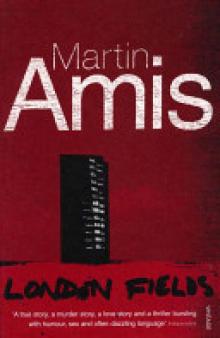 London Fields
London Fields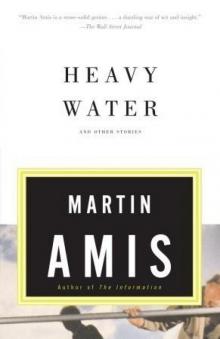 Heavy Water: And Other Stories
Heavy Water: And Other Stories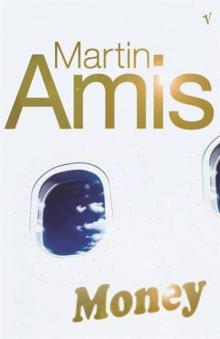 Money
Money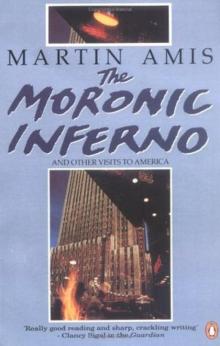 The Moronic Inferno and Other Visits to America
The Moronic Inferno and Other Visits to America Yellow Dog
Yellow Dog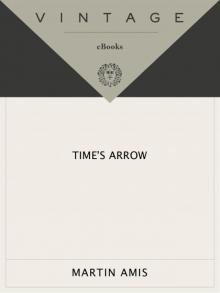 Time's Arrow
Time's Arrow Experience: A Memoir
Experience: A Memoir Einstein's Monsters
Einstein's Monsters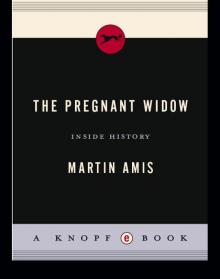 The Pregnant Widow
The Pregnant Widow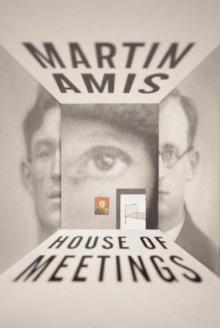 House of Meetings
House of Meetings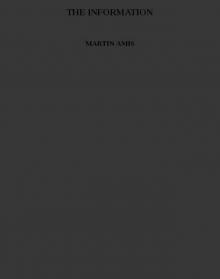 The Information
The Information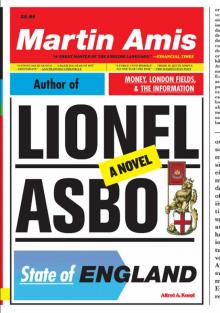 Lionel Asbo: State of England
Lionel Asbo: State of England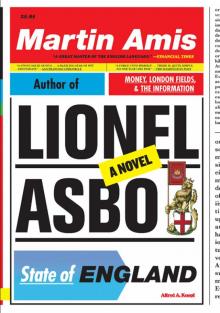 Lionel Asbo
Lionel Asbo Heavy Water and Other Stories
Heavy Water and Other Stories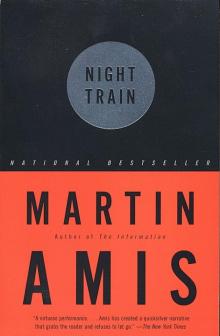 Night Train
Night Train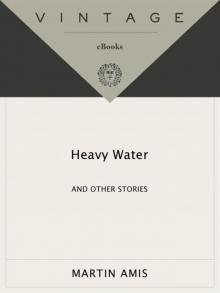 Heavy Water
Heavy Water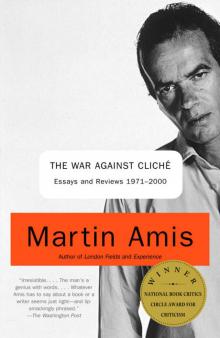 The War Against Cliche: Essays and Reviews 1971-2000 (Vintage International)
The War Against Cliche: Essays and Reviews 1971-2000 (Vintage International)